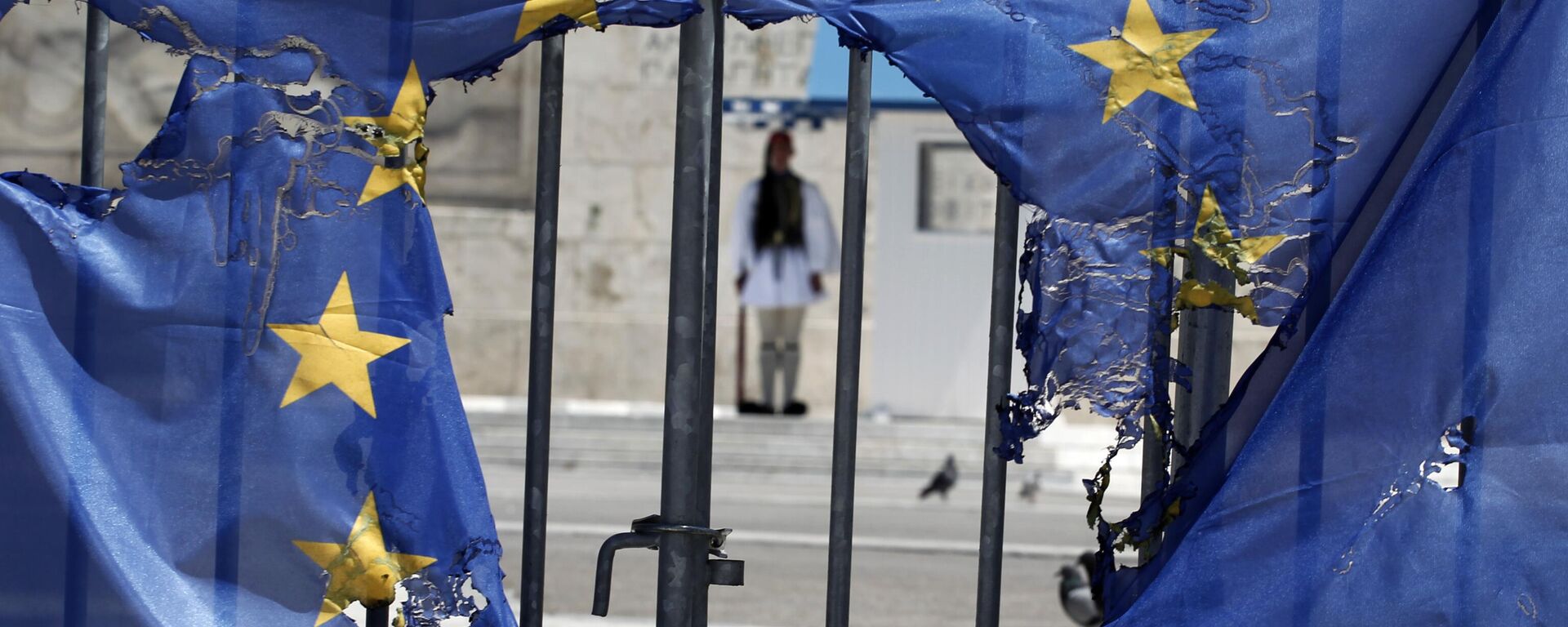https://sputnikglobe.com/20240608/eus-russia-sanctions-satastrophic-for-greek-economy---former-greek-energy-minister-1118877015.html
EU's Russia Sanctions 'Сatastrophic' for Greek Economy - Former Greek Energy Minister
EU's Russia Sanctions 'Сatastrophic' for Greek Economy - Former Greek Energy Minister
Sputnik International
The European Union's sanctions against Russia had a "catastrophic" effect on Greece's economy, Panagiotis Lafazanis, a prominent Greek opposition politician and former energy minister, told Sputnik, adding that the EU country was already plunged into a crisis, including in the economic sector.
2024-06-08T16:58+0000
2024-06-08T16:58+0000
2024-06-09T16:57+0000
economy
greece
russia
european union (eu)
greek finance ministry
international monetary fund
panagiotis lafazanis
sanctions
russian economy under sanctions
st. petersburg international economic forum (spief)
https://cdn1.img.sputnikglobe.com/img/102561/07/1025610742_0:325:4000:2575_1920x0_80_0_0_061372fec832d138a524715c98819e1c.jpg
"No one has ever asked the Greek public about the sanctions that Greece adopted together with the European Union against Russia. That is, the Greek government, despite the public opinion, accepted with closed eyes what the United States pushed through Europe. I would call these sanctions catastrophic for Greece, because Greece had already been in a big crisis before, especially in an economic crisis," Lafazanis said on the sidelines of the St. Petersburg International Economic Forum (SPIEF) in Russia. The politician said that the EU sanctions against Russia "delivered the last blow" to the Greek economy against the backdrop of an already dire economic situation in Greece caused by tough measures taken by the International Monetary Fund and other organizations since 2010. Lafazanis, who founded a new party called Democratic Movement of National Liberation in the beginning of 2023, also expressed disapproval over the EU sanctions against Belarus, saying that Greece used the logistics routes through Belarus for its exports to Russia. He noted that the change of Greece's policy was the only way to overcome the crisis caused by EU sanctions against Russia, adding that it was difficult to determine the exact period when Greek economy would be able to recover. The ex-energy minister said that Greece had been suffering from energy shortages, including gas supplies, amid constantly changing situation in the country's energy sector. "The situation with gas supplies is changing every day and we [the Democratic Movement of National Liberation party], as a political party, are making every effort to resolve this issue for the benefit of the peoples of Greece and Russia," he added. At the same time, the European Statistical Office (Eurostat) said that Greece ranked second to last in the European Union in terms of GDP per capita, ahead only of Bulgaria. Greece was 33% below the European average, while Bulgaria was 36% lower.Addressing the same issue at the concluding press conference of SPIEF-2024, Anton Kobyakov, Advisor to the President of the Russian Federation and responsible secretary of the organizing committee, stated:The Russian city of St. Petersburg is hosting the 27th edition of SPIEF from June 5-8. Last year, the forum drew 17,000 participants from 130 countries and saw the signing of more than 900 agreements.
https://sputnikglobe.com/20240605/greek-epam-party-calls-for-lifting-sanctions-against-russia-dialogue-1118775075.html
https://sputnikglobe.com/20240215/europe-in-for-very-rocky-times-after-failed-sanctions-on-russia---expert-1116791959.html
greece
russia
Sputnik International
feedback@sputniknews.com
+74956456601
MIA „Rossiya Segodnya“
2024
Sputnik International
feedback@sputniknews.com
+74956456601
MIA „Rossiya Segodnya“
News
en_EN
Sputnik International
feedback@sputniknews.com
+74956456601
MIA „Rossiya Segodnya“
Sputnik International
feedback@sputniknews.com
+74956456601
MIA „Rossiya Segodnya“
eu sanctions against russia, anti-russian sanctions, greece, greek economy, how sanctions against russia affect eu states, st. petersburg international economic forum (spief), spief 2024
eu sanctions against russia, anti-russian sanctions, greece, greek economy, how sanctions against russia affect eu states, st. petersburg international economic forum (spief), spief 2024
EU's Russia Sanctions 'Сatastrophic' for Greek Economy - Former Greek Energy Minister
16:58 GMT 08.06.2024 (Updated: 16:57 GMT 09.06.2024) ST. PETERSBURG, Russia (Sputnik) - The European Union's sanctions against Russia had a "catastrophic" effect on Greece's economy, Panagiotis Lafazanis, a prominent Greek opposition politician and former energy minister, told Sputnik, adding that the EU country was already plunged into a crisis, including in the economic sector.
"No one has ever asked the Greek public about the sanctions that Greece adopted together with the European Union against Russia. That is, the Greek government, despite the public opinion, accepted with closed eyes what the United States pushed through Europe. I would call these sanctions catastrophic for Greece, because Greece had already been in a big crisis before, especially in an economic crisis," Lafazanis said on the sidelines of the St. Petersburg International Economic Forum (SPIEF) in Russia.
The politician said that the EU
sanctions against Russia "delivered the last blow" to the Greek economy against the backdrop of an
already dire economic situation in Greece caused by tough measures taken by the International Monetary Fund and other organizations since 2010.
Lafazanis, who founded a new party called Democratic Movement of National Liberation in the beginning of 2023, also expressed disapproval over the EU sanctions against Belarus, saying that Greece used the logistics routes through Belarus for its exports to Russia.
He noted that the change of Greece's policy was the only way to overcome the crisis caused by EU sanctions against Russia, adding that it was difficult to determine the exact period when Greek economy would be able to recover.
"Nobody can easily determine this period, but it goes without saying that it will take a long time to overcome this [crisis] ... Greece is still in its crisis, so it will be more difficult to resolve the issues created by sanctions against Russia. The only way is to change the Greek policy and the economic policy itself that [the change] is not being conducted by the current government," Lafazanis also said.
The ex-energy minister said that Greece had been suffering from
energy shortages, including
gas supplies, amid constantly changing situation in the country's energy sector.

15 February 2024, 04:29 GMT
"The situation with gas supplies is changing every day and we [the Democratic Movement of National Liberation party], as a political party, are making every effort to resolve this issue for the benefit of the peoples of Greece and Russia," he added.
In March, the Greek Finance Ministry said, citing data from the European Commission, that Greece was the European champion in terms of real GDP per capita growth. It rose by 2.5%, from 18,690 euros ($20,192) in 2022 to 19,150 euros in 2023 at constant 2010 prices. In the same year, real per capita income in the European Union stagnated and actually fell slightly, the ministry said.
At the same time, the European Statistical Office (Eurostat) said that Greece ranked second to last in the European Union in terms of GDP per capita, ahead only of Bulgaria. Greece was 33% below the European average, while Bulgaria was 36% lower.
Addressing the same issue at the concluding press conference of SPIEF-2024, Anton Kobyakov, Advisor to the President of the Russian Federation and responsible secretary of the organizing committee, stated:
The United States and all Western countries have long been living in debt! Their accumulated debts are so immense that they can never be repaid. Instead, the entire world pays for their demands and consumption rates, and those who oppose face harsh repression! Today's wars are indeed the repayment of accumulated debts.
The Russian city of St. Petersburg is hosting the 27th edition of SPIEF from June 5-8. Last year, the forum drew 17,000 participants from 130 countries and saw the signing of more than 900 agreements.




